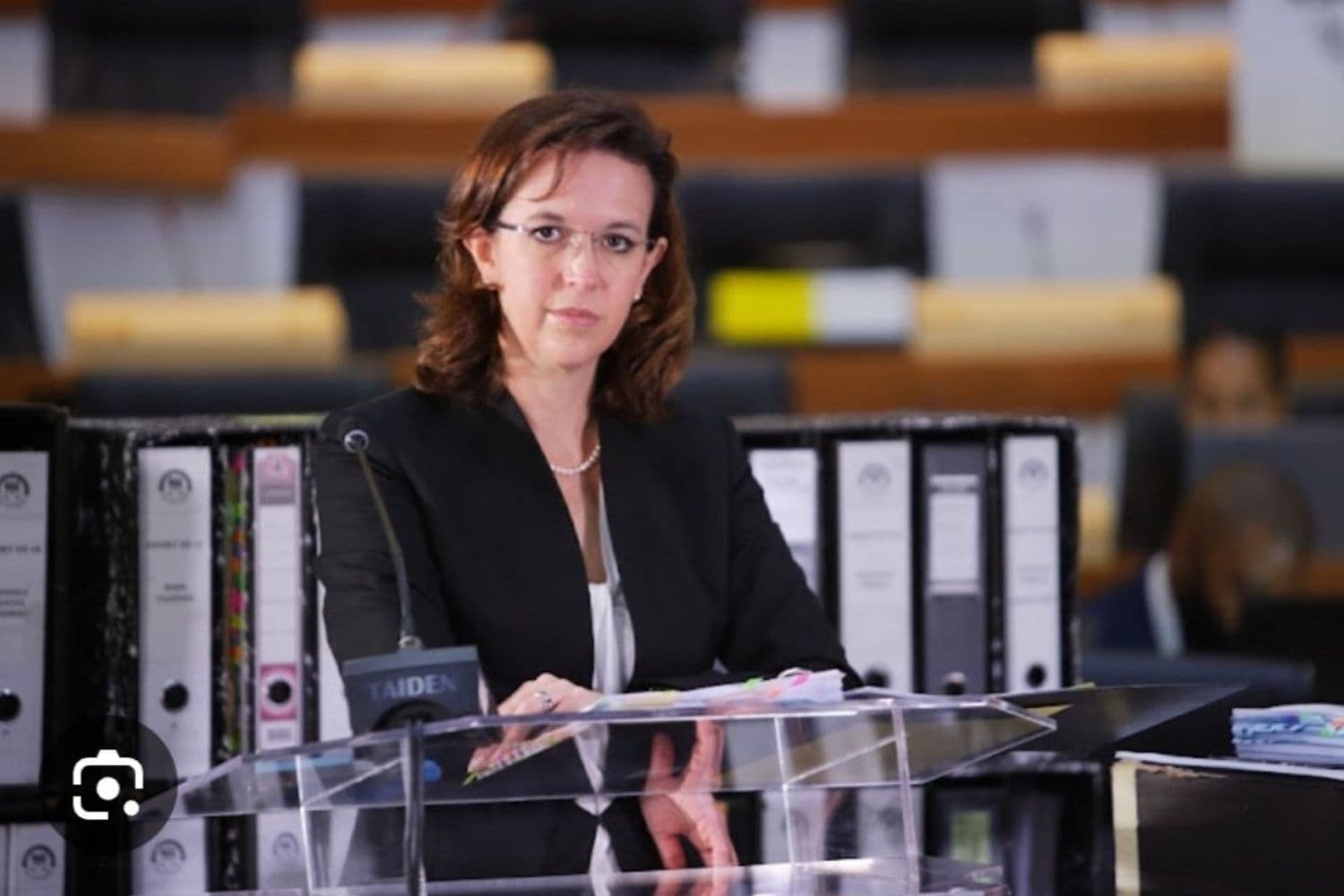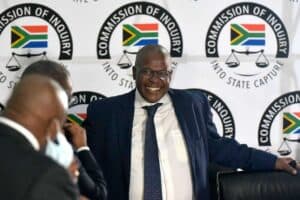Ramaphosa’s lawyer argued that cases that can exclusively be decided by the Constitutional Court are very limited.

The Constitutional Court on Wednesday heard that MK party president Jacob Zuma’s challenge to President Cyril Ramaphosa’s decisions following the allegations by KwaZulu-Natal (KZN) police chief Lieutenant General Nhlanhla Mkhwanazi should rather have been launched in the high court.
Zuma is challenging Ramaphosa’s decision to place Minister of Police Senzo Mchunu on special leave and appoint Wits law professor Firoz Cachalia as acting police minister.
Chief Justice Mandisa Maya and Deputy Chief Justice Mbuyiseli Madlanga were not part of the bench hearing the matter on Wednesday.
Among the claims made by Mkhwanazi were those of criminal infiltration in the South African justice system and that Mchunu intervened to disband the KZN political killings task team in order to shield individuals linked to politically connected crime syndicates.
ConCourt cases
In a long day of intense arguments, Ramaphosa’s lawyer Kate Hofmeyr said cases that can exclusively be decided by the Constitutional Court are very limited.
“This matter does not fall within this court’s exclusive jurisdiction. Very few matters do, and this is not one of them.
“Any allegation that the power was exercised unlawfully falls under our constitutional scheme to the High Court and the Supreme Court of Appeal (SCA) to consider first. Additionally, there is no pressing need for this court, on 10 days’ notice, to decide the issues in this matter as a court of first and last instance,” Hofmeyr said.
Zuma and MK party
Hofmeyr also argued that even if the apex court were to entertain Zuma and the MK party’s case, it is common cause that Ramaphosa enjoys broad discretion to appoint and dismiss ministers.
“That power, plainly, includes the lesser power of placing those ministers on leave while serious allegations of impropriety are being investigated. The constitution gives the president the power to decide how to manage his Cabinet.
“The wisdom of the choices he makes is to be judged by the democratic process and not the courts,” Hofmeyr argued.
Jurisdiction
Hofmeyr argued that Zuma and the MK party have made no case why the Constitutional Court has exclusive jurisdiction to hear their “urgent case”.
She said should the Constitutional Court widen its criteria for exclusive jurisdiction for the Zuma/MK party matter, it would mean that any case involving the exercise of the president’s powers can be brought before the apex court.
“If this court in this judgment widens its jurisdictional ambit to take this case, it will likely mean, amongst other things, that all powers that are granted to the president under the Constitution, powers to assent to bills, powers to call for national referenda, to pardon offenders, to confer honours, will come here and on here as this court of first and final instance. And that would make a mockery of the prior jurisprudence of this court.”
[WATCH] Kate Hofmeyr SC, on behalf of President Ramaphosa, says this matter does not fall within the Constitutional Court’s exclusive jurisdiction, noting that very few matters do and this is not one of them. pic.twitter.com/OeH7ZtiHwl
— SABC News (@SABCNews) July 30, 2025
ALSO READ: Zuma says Ramaphosa has no constitutional power to suspend Mchunu
Urgency
Justice Rammaka Mathopo asked Hofmeyer if she “reckoned that the public importance of the matter could have been entertained by the High Court?”
“Certainly. There are manifold cases of great constitutional significance that appropriately start in the High Court. Justice Mathopo, this court has said in its own judgments how its workload is crippling currently. The expansion of its jurisdiction means it is a court that should be engaged as a court of last resort because that advances the administration of justice,” Hofmeyer said.
“There is such importance behind this point. The administration of justice requires this court to sit when it must sit and to deal with its extraordinary backlog that it currently faces.
“If this court can be the court that every litigant comes to when it alleges that there has been some irregular exercise of power by the president, all the other cases that legitimately must be here, the cases in which this court must sit as an appellate court are shifted down the roll, and that in our constitutional scheme is reason to be very cautious,” Hofmeyr said.
‘Punishing consequences’
Ramaphosa, in his heads of argument, said the urgent application initiated by Zuma directly to the Constitutional Court without approaching lower courts will have “far-reaching and punishing consequences” for the apex court.
“Despite this, the court has been asked by the applicants to convene itself on hyper urgent timelines, and to determine alone, and finally, the meaning of constitutional provisions that will have far-reaching consequences for the exercise of power by the president well into the future.”
Justice Steven Majiedt asked Hofmeyr why the Constitutional Court shouldn’t hear the matter, “given the fact that it goes to national security and that it implicates a wide range of actors, even the judiciary”.
[WATCH] Kate Hofmeyr SC, on behalf of President Ramaphosa, says, “When an interim interdict is sought, there is no final determination on the ultimate legal question. It is done at a prima facie level.” pic.twitter.com/RfTISVezLW
— SABC News (@SABCNews) July 30, 2025
Hofmeyr said that many cases involve matters of grave constitutional significance.
“But our constitutional scheme says those start in the high court. The high court is where you go. The high court moves urgently, more easily than this court does.”
Hofmeyr added that former chief justice Magoeng Mogoeng “spoke about the monopoly power of the apex court, which is why it needs to be highly selective about the cases it hears”.
Mathopo asked what will happen to Cachalia’s appointment if Hofmeyr is right that Zuma and the MK party have not made a case for direct access to the Constitutional Court, or proved that it has exclusive jurisdiction to hear the case.
Hofmeyr said Cachalia will take office and the Madlanga Inquiry will continue.
“And that is the consequence, Justice Mathopo, when litigants go before the wrong forum, it is just simply the consequence. If you go before the forum that didn’t have jurisdiction, you suffer this consequence.”
Jurisdiction
She slammed the MK party and Zuma’s case, saying that they put together court jurisdiction for this Constitutional Court in “two paragraphs of their founding affidavit”.
“This is such an important issue, and they devoted two paragraphs to it.”
Earlier, Advocate Dali Mpofu, representing Zuma, was asked by Justice Leana Theron to explain why Zuma and the MK party could not have brought their challenge in the high court and where they address this in their court papers.
According to Mpofu, the case deals with “crisp” constitutional issues that would inevitably result in the apex court dealing with this matter anyway.
Mpofu argued that if Zuma and the MK party had taken the time required to go through the court system with the application, “we would have no country left”.
‘Crucify’ Mchunu
During the day’s proceedings, Advocate Griffiths Madonsela, for Police Minister Senzo Mchunu, argued that Zuma and the MK party, in their founding papers, called this “suspension by another name”.
“We embrace that characterisation. The MK party drew out spears, crying out, ‘crucify him, crucify him.’ That’s what they said when the president arrived. They said he must dismiss the minister… in their founding papers. That’s the case they made out.
“The case they made out in reply at page 236, paragraph 90, they repeated that claim. They said the minister should have been dismissed. He deserved to be dismissed, as it happened with Whitfield at paragraph 90 of the replying affidavit.
“It was in this context that the president, after consultation with Minister Mchunu, and you’ll find this in the answering affidavit at page 172, paragraph 12, where the minister says that I was consulted by the president about this and he confronted me about the allegations made by General Mkhwanazi and I denied wrongful conduct on my part. And that under those circumstances, the president said, I couldn’t dissolve the issue. I’ll place Minister Mchunu on special leave,” Madonsela said.
He focused his address on arguing that Ramaphosa does have the power to place Mchunu on special leave, which he accepts amounted to the minister being suspended.
He also defended the rationality of the president’s decisions in response to Mkhwanazi’s accusations.
[WATCH] Advocate Griffiths Madonsela SC, for Police Minister Senzo Mchunu, says: "The applicants said, in their founding papers, this 'suspension by another name,' and we embrace that characterisation." pic.twitter.com/Ve1qc9xe2R
— SABC News (@SABCNews) July 30, 2025
Commission
Ramaphosa set up a judicial commission of inquiry to investigate the allegations and appointed Cachalia as acting police minister.
Mpofu, representing Zuma, argued that the leave of absence granted to Mchunu is central to the MK party’s case because if it had not been granted, there would be no need to appoint Cachalia in an acting position.
According to the MK party, Mkhwanazi’s accusations “raise urgent and serious concerns around the constitution, the rule of law and national security”.
While Ramaphosa said he had placed Mchunu on special leave to allow the Madlanga Commission to properly investigate the claims, Mpofu said questions need to be raised about whether “another multibillion rand commission” was “in the best interests of our people”.
The MK party wants the court to decide urgently on the matter because Cachalia will assume office on 1 August.
Cachalia
Advocate Ngwako Maenetje, who also represented Ramaphosa, argued that Ramaphosa’s decision to place Mchunu on leave of absence was good governance because it ensured there was no possibility of interference in the investigation into Mkhwanazi’s allegations.
He also responded to questions about the president’s decision to appoint Cachalia in an acting capacity while the Madlanga Inquiry investigates the allegations levelled against Mchunu.
Maenetje reiterated that Ramaphosa cannot exercise his power to dismiss on the basis of serious allegations that are untested.
Mpofu agreed that Ramaphosa had the power to appoint Cachalia as the police minister. “What he did not have the power to do was appoint him to an acting position.”
Judgment has been reserved.
ALSO READ: Madlanga inquiry: How much probe into Mkhwanazi’s allegations will cost
Support Local Journalism
Add The Citizen as a Preferred Source on Google and follow us on Google News to see more of our trusted reporting in Google News and Top Stories.








